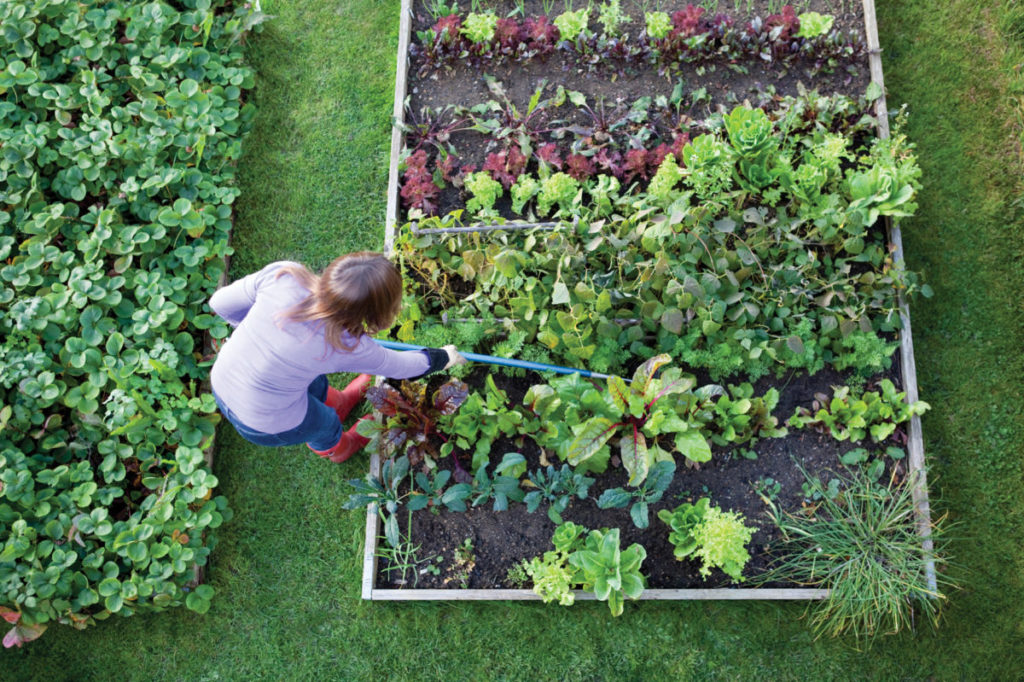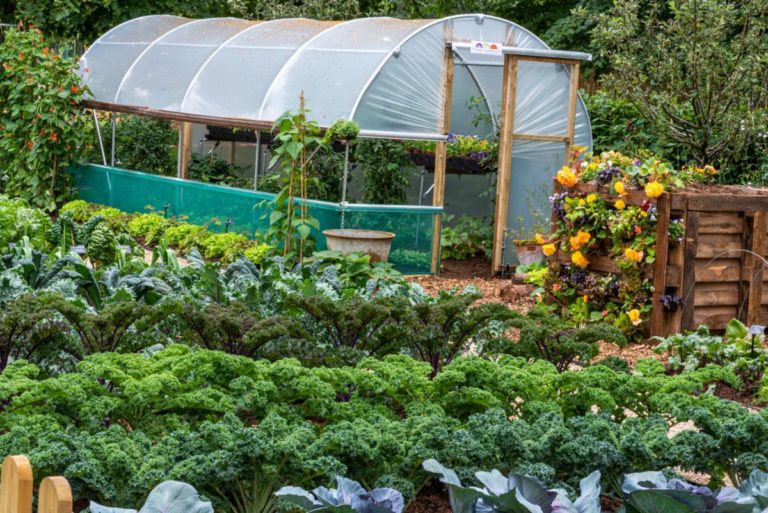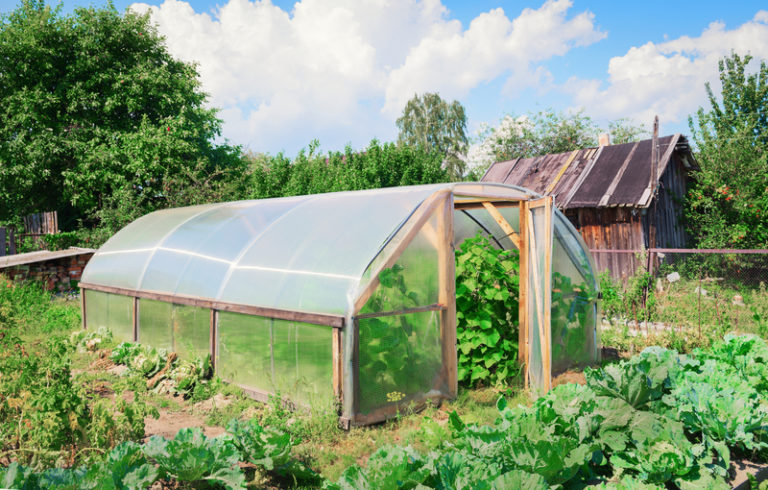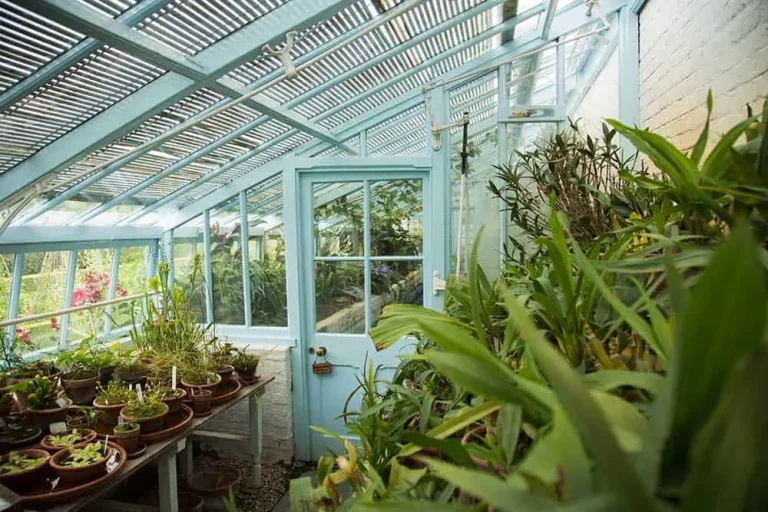Off-grid vegetable growing is a rewarding and self-sufficient way to produce fresh, healthy food without relying on public utilities.
To achieve success in off-grid gardening, you’ll need the right tools to help you cultivate your crops and protect them from pests and diseases.
We’ll cover the must-have tools for successful off-grid vegetable growing, including high-quality seeds, a reliable water source, sharp hand pruners, and more.
Whether you’re just starting out or looking to improve your existing garden, these essential tools will help you grow a thriving crop of delicious and nutritious vegetables off the grid.
A good quality garden gloves
Gardening can be tough on your hands, so it’s essential to have a reliable pair of gloves to protect your skin from thorns, prickles, and dirt. Look for gloves made from breathable materials like cotton, linen, or synthetic fabrics.
Gardening can be tough on your hands, especially when dealing with thorny plants or prickly stems.
Rough branches and sharp objects can cause scratches, cuts, and even puncture wounds, which can lead to infections and discomfort.
Handling damp soil and muddy conditions can leave your hands feeling dirty and grimy.
This is where a reliable pair of garden gloves comes in, protecting your skin from these harsh elements and providing a layer of defense against potential hazards.
When selecting a pair of garden gloves, look for ones made from breathable materials like cotton, linen, or synthetic fabrics.
These materials allow for airflow and moisture-wicking properties, keeping your hands cool and dry during extended gardening sessions.
Look for features like reinforced fingertips, grip-enhancing textures, and adjustable cuffs for a snug fit.
Consider the style and length of the gloves based on your specific gardening needs, as some gloves are designed for specific tasks like pruning or weeding.
With a good pair of garden gloves, you can enjoy your gardening activities with confidence and comfort, knowing that your hands are well-protected.
A garden hoe
A garden hoe is a versatile tool that can be used to till soil, weed, and cultivate your vegetable beds. Look for a hoe with a sturdy handle and a broad, flat blade.
When it comes to cultivating your vegetable beds, a garden hoe is an indispensable tool.
Not only can it be used to till soil, but it can also help you weed and maintain your garden with ease.
To choose the right hoe for your garden, look for one with a sturdy handle and a broad, flat blade.
The handle should be long enough to provide leverage and comfort while hoeing, and the blade should be broad enough to easily slice through the soil and remove weeds.
A flat blade is also ideal for cultivating vegetables, as it allows you to easily turn over the soil and loosen the roots of your plants.
Consider the material of the hoe’s blade and handle, as stainless steel or fiberglass materials can withstand harsh weather conditions and last longer than traditional wood or metal hoes.
With a good garden hoe, you’ll be able to keep your vegetable beds well-maintained and weed-free, ensuring a healthy and productive garden all season long.
A watering can or irrigation system
Regular watering is essential for off-grid vegetable growing, and a watering can or irrigation system can help ensure that your plants receive the right amount of moisture. Consider investing in a system that can automate your watering schedule.
Investing in a watering can or irrigation system is a wise decision for off-grid vegetable growers who aim to maintain a healthy and productive garden.
Regular watering is essential to ensure your plants receive the right amount of moisture, and an automated system can help you achieve this goal with ease.
With an irrigation system, you can set up a regular watering schedule that suits your plants’ needs, whether it’s daily, weekly, or bi-weekly watering.
This will not only save you time but also ensure that your plants receive the optimal amount of water, without overwatering or underwatering.
Moreover, an irrigation system can be customized to accommodate different types of plants, soil conditions, and climates.
For instance, you can adjust the pressure, flow rate, and duration of watering based on the specific requirements of each plant.
This flexibility ensures that your plants receive the precise amount of moisture they need, maximizing their growth and productivity.
Another significant advantage of an irrigation system is its ability to maintain consistent water pressure.
This is especially important for off-grid growers who may experience fluctuations in water pressure due to weather conditions or other factors.
With an irrigation system, you can ensure a consistent water supply, regardless of the outside conditions, which can help protect your plants from droughts or overwatering.
With an automated system, you can ensure regular watering, customize watering schedules based on plant requirements, and maintain consistent water pressure, all of which contribute to optimum plant growth.
](https://thegrowers.org/beginners-guide-to-off-grid-vegetable-growing/)
Regular watering is essential for the growth and health of vegetables grown off the grid.
](https://thegrowers.org/beginners-guide-to-off-grid-vegetable-growing/)
](https://thegrowers.org/beginners-guide-to-off-grid-vegetable-growing/)
Off-grid vegetable growers can benefit from using a watering can or irrigation system to ensure their plants receive regular and customized watering.
Irrigation systems offer several advantages over manual watering with a can.
First, they allow for precise control over the amount of water applied to each plant based on their specific water requirements.
This means that growers can customize watering schedules based on the needs of each individual plant, rather than relying on a generic watering schedule.
Irrigation systems can help to prevent over-watering or under-watering, which can lead to plant disease or nutrient imbalances.
Furthermore, using an irrigation system reduces the labor and time required for manual watering, allowing growers to focus on other aspects of their off-grid garden.
A wheelbarrow or cart
Transporting heavy loads of soil, compost, or harvested vegetables can be a challenge, but a wheelbarrow or cart can make it much easier. Look for a sturdy option with plenty of storage space.
A wheelbarrow or cart is an essential tool for any serious gardener or farmer.
Transporting heavy loads of soil, compost, or harvested vegetables can be a daunting task, but with a sturdy wheelbarrow or cart, you’ll make light work of it.
Look for a high-quality option with a strong frame and ample storage space to ensure you can haul all the materials you need.
A wheelbarrow or cart will not only save you time and effort but also reduce the risk of injury from lugging heavy loads.
Consider the size of your garden or farm, as well as the terrain and the weight of the materials you’ll be transporting, when selecting the appropriate wheelbarrow or cart for your needs.
With a reliable and efficient wheelbarrow or cart, you’ll be able to focus on the joy of growing and harvesting your crops, rather than the drudgery of transporting them.
Compost bin or tumbling composter
Composting is a important part of off-grid vegetable growing, as it can turn food scraps and other organic materials into nutrient-rich soil amendments. Consider investing in a compost bin or tumbling composter to make the process easier and more efficient.
As an aspiring off-grid vegetable grower, investing in a compost bin or tumbling composter is a important step towards creating a sustainable and self-sufficient gardening system.
Composting is the process of breaking down organic materials, such as food scraps and yard waste, into nutrient-rich soil amendments that can help improve soil health, increase crop yields, and reduce waste.
A compost bin or tumbling composter provides a controlled environment for composting, making the process easier and more efficient.
With a compost bin, you can easily collect and store organic materials, ensuring that they are consistently exposed to air and moisture, which are essential for decomposition.
A tumbling composter, on the other hand, allows for easier mixing and aeration of the composting materials, promoting a more rapid and complete breakdown.
In addition to improving soil health, composting can also help to reduce waste and decrease your reliance on synthetic fertilizers and soil amendments.
By incorporating compost into your gardening routine, you can create a more sustainable and self-sufficient system that is better able to produce healthy, vibrant crops.
Plus, composting is a great way to repurpose kitchen scraps and other organic materials that might otherwise end up in landfills.
Overall, investing in a compost bin or tumbling composter is a smart decision for any aspiring off-grid vegetable grower.
Not only can it help improve soil health and reduce waste, but it can also be a valuable tool in creating a more sustainable and self-sufficient gardening system.
Support structures like trellises or cages
Many vegetables, like tomatoes and peas, need support to grow upright and produce well. Consider investing in trellises, cages, or other support structures to help your plants grow strong and healthy.
Support structures like trellises or cages are essential for many vegetables, such as tomatoes and peas, to grow upright and produce well.
These support systems help to train the plants to grow in a specific direction, providing the perfect amount of support and space for them to thrive.
For example, tomato plants need support to keep them upright and prevent them from sprawling on the ground, which can cause the fruit to come into contact with the soil and become diseased.
Similarly, peas need support to keep them upright and prevent them from becoming too leggy and sprawling.
Trellises and cages can be made of a variety of materials, such as wood, metal, or plastic, and can be customized to fit the specific needs of your garden.
They can be purchased at gardening stores or made at home using materials like bamboo or wire.
By investing in support structures for your vegetable garden, you can help to improve the health and productivity of your plants, leading to increased yields and a more successful harvest.
Support structures can also help to add structure and beauty to your garden, making it aesthetically pleasing and a pleasure to maintain.
Consider investing in support structures like trellises or cages for your vegetable garden today and reap the numerous benefits they provide!
Row covers or floating row covers
Row covers or floating row covers can help protect your plants from pests, diseases, and extreme weather conditions. Look for lightweight, breathable materials like mesh or cotton to allow for air and light penetration while still providing insulation.
Row covers or floating row covers are a versatile and effective solution for protecting your plants from pests, diseases, and extreme weather conditions.
These lightweight, breathable covers are made of materials like mesh or cotton, allowing for air and light penetration while still providing insulation.
By using row covers, you can create a barrier between your plants and the elements, helping to prevent infestations, infections, and damage caused by harsh weather.
When selecting a row cover, look for one that is lightweight and flexible, allowing you to easily position and remove it as needed.
Mesh or cotton materials are excellent choices, as they allow for air and light to reach your plants while keeping pests and diseases at bay.
Consider the size of your row cover, ensuring it is large enough to cover your entire plant bed but not so large that it becomes cumbersome to handle.
To use row covers effectively, carefully place them over your plants, ensuring that they are securely fastened to prevent wind or other elements from displacing them.
Depending on the severity of the pests, diseases, or weather conditions in your area, you may need to adjust the tightness of the row cover to provide optimal protection.
For example, if your plants are susceptible to frost, you may need to secure the row cover more tightly to prevent frost from seeping in.
In addition to protecting your plants from pests and diseases, row covers can also help to regulate soil temperature and retain moisture.
This is especially useful in areas with extreme temperatures or dry climates, where plants may struggle to thrive without proper protection.
By using row covers, you can create a microclimate around your plants, allowing them to grow and thrive even in challenging conditions.
Overall, row covers are a versatile and effective tool for protecting your plants from pests, diseases, and extreme weather conditions.
By carefully selecting the right type of row cover for your plants and using it effectively, you can create a healthy and productive garden that yields delicious fruits and vegetables for you and your family to enjoy.
Irrigation system
A reliable irrigation system can be the difference between a healthy, thriving garden and one that suffers from lack of water. Consider investing in a drip irrigation system or soaker hoses to deliver water directly to the roots of your plants, reducing evaporation and runoff.
A reliable irrigation system is essential for maintaining a healthy and thriving garden.
Unlike traditional sprinkler systems that spray water overhead, drip irrigation systems and soaker hoses deliver water directly to the roots of your plants.
This targeted approach reduces evaporation and runoff, ensuring that your plants receive the exact amount of water they need.
By investing in a high-quality irrigation system, you can improve the overall health of your garden, increase crop yields, and reduce wasteful water usage.
Drip irrigation systems can be customized to accommodate the unique needs of your garden, with different tubes and emitters available for different plant types and soil conditions.
By selecting the right components and properly installing the system, you can enjoy a lush, thriving garden that requires minimal maintenance and care.
Want More? Dive Deeper Here!
Hey there! If you’re the type who loves going down the rabbit hole of information (like we do), you’re in the right spot. We’ve pulled together some cool reads and resources that dive a bit deeper into the stuff we chat about on our site. Whether you’re just killing time or super into the topic, these picks might just be what you’re looking for. Happy reading!






